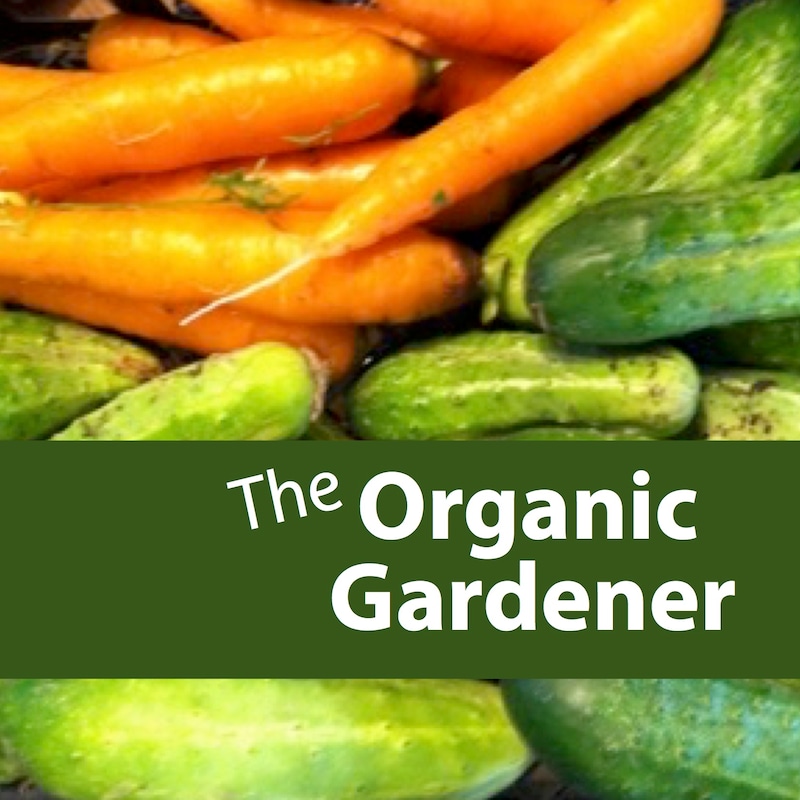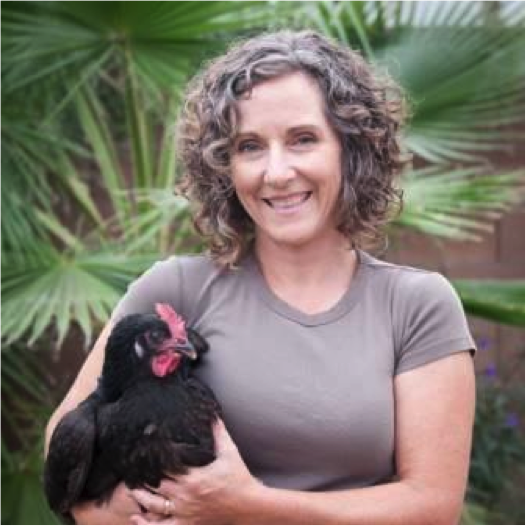
Shownotes
Greg Peterson host of the Urban Farm Podcast is here to share his gardening knowledge and expertise.
I call my audience Green Future Growers people who are interested in growing a more earth friendly world and taking care of our planet. I know you’ve been doing this for a long time and taking care of the southern part of the US. I’m just the humble host. I have an inner desire to be a biographer some day so this is like getting to do mini-biographies and I get to hear them first so I feel a little spoiled. I am hoping to get 32 episodes done over the summer break to get through to Christmas.
I tell people that if we could
I am a true believer that we need to grow our own food!
My husband believes that and as an educator. He would love to be an locovore, but we’re not likely to give up coffee and I’m not ready to give up chocolate!
Tell us a little about yourself.
I’m 56 years old. I planted my first garden in 1975 I would have been 14. That same year I wrote a paper on over-fishing the oceans. How does someone know we were over fishing our oceans? IDK. I just knew back then there was a problem. I knew that I could do something about it.
In 1991, I made a couple of discoveries
I discovered permaculture
the arena of science of nature that mimics natural systems
human beings love to think we can do it better then nature, but I know without a doubt nature always bats last.
will always
How do we work with nature.
I love the way you put that. That’s a really nice way to describe permaculture. I had never heard of permaculture till I started my podcast. That’s pretty young to learn about permaculture! 1991, that’s when Mike and met and we got married in 1993.
Tell me about your first gardening experience? What were you doing planting a garden at 14?
Good question! My mom grew up on a farm in Canada. She wasn’t always
moved from a town house to a half acre. when we moved in the weldon house
She said see the right half of the backyard that’s your garden! Go start digging!
I’ve had conversations with her, we both don’t really know where the impetus for me to garden came from or where the desire to garden was? It was just there!
What about your grandparents?
Good question. I didn’t really know either side of my grandparents. You know maybe where we would go up once every 5 years in the summer time.
I met them 3-4 times
I did an event recently where we were asked to talk about a childhood memory around food. What came up for me was my grandfather who came from Czechoslovakia he didn’t speak English and I didn’t speak Czech but he took me out to the bee houses and I have a memory of him showing
self projected
Somebody about 5 years ago, in a lecture…
How does a 15-14 year old in 1975 get this notion about the oceans and you have to do something about it?
Jacques Cousteau
You were probably a great big fan of Jacques Cousteau weren’t you?
And this flush of knowing came across me.
That’s probably where
Dude! I have a Jacques Cousteau Play! Of course I remember the TV show! I just turned 50. We watched it. And remember the show that came on before Disney. I remember sitting with my parents eating dinner. My kids are so funny they love to do the Jacques Cousteau play, but it has 2 problems. 1 it only has like 2-3 lead parts and a bunch of little parts and then also I have done it with 2nd graders and it’s really for 4th graders!
How did you learn how to garden organically?
Arizona is in the desert! 2 weeks ago it was 119º. Once it gets over 105º its’ just crazy stupid hot! We probably have 80 days in the summertime that go over 105.
Ohhhh! I couldn’t live there!
Starting at mid may – sept if we have a day under the 100 it’s rare. The best time to grow is in fall winter and spring. The hardest time to grow things are in the summer. We actually have 4 growing seasons here. We can basically everything here!
We had a frost on August 8th one year I think. So tell us one of your tricks.
Trick #1
The biggest one is we have to plant shade!
there are a handful of amazing desert plants
- paloverde
- pionwood
- mesquite
that are all edible and make great nurse plants
plant these larger desert trees on the west side of the project over the course of 3-5 years they grow up. They are a nice filtered shade. It filters out 60% of the sun coming in!
Not a dense shade like an oak tree
The other nice thing is they can be pruned like a nice umbrella shape
- Nice trunk up the middle
- nice canopy that reaches 15 feet in each directions
- 30 foot diameter trees
Trick #2
We have winter growing gardens
- winter growing gardens
- different micro climates
Microclimate is a space that is cooler or warmer
In permaculutre
what we like people to do is go out
- observe
- take notes
winter time
warmer microclimates
Summertime Growing
cooler microclimates
Isn’t that interesting. Kind of like people. For us we need most of our stuff in the summer for maximum sun. I need to cut down these trees that are putting out too much shade? Are they deciduous trees? Or evergreens?
Desert Trees
- Desert trees are semi deciduous lose some leaves the cool thing is they are also nitrogen fixers
- take nitrogen out of air and soil and put it into the leaves,
- when the leaves drop you have a nice source of nitrogen that creates great compost and you just add it to your soil!
Planting Calendar for deserts
What do you grow in those cooler or warmer microclimates?
What I did about 15 years ago is I put together my planting calendar. It’s a desert adapted planting calendar! You can download it at plantingcalendar.org
It’s specific for low desert environments
tells you month what to plant then
In the fall
hardy greens
- kale
- swiss chard
- lettuces
in oct nov
brassicas in the fall
- brocolis
- cabbages
- cauliflower
- snowpeas
- garlic
- onions
- beets
- carrots
Winter Planting
- tomatoes
- peppers
are pretty hardy
go in in Jan
knowing if you get a frost if it gets cooler
Summer Planting
Summer stuff starting in march
- pumpkins
- cucumbers
- watermelons
in april
harvest
June and July
Educate people about fruit trees and then they can get fruit trees from me.
Stone fruit
- peaches
- apricots
- plums
harvest in July 1st
anything with a pit in the middle of it is a stone fruit
like a
- peach
- apricot
- almonds
- nectarines
Tell us about your school and courses
Urban Farm U is an online portal to teach you on how to grow your own food
We offer 7 different courses
webinars on seed saving
and

do Ask Jake and Greg once a month where we are basically fielding people’s questions.
So I want my husband to jump on Facebook live with me. What do we do if someone asks us a question we don’t know the answer to?
Those are the best ones!
do you know everything?
Heck no!
Neither do I! I only know what I’ve experienced, usually what I do in that case, I’ll be checking out google for resources. Nice thing about having 2 of us so we can bounce off of each other.
I start asking
nice thing what I’ve done over 42 years, I can get a sense of what somebody’s saying is the truth or not.
I feel like I spend a lot of time explaining to people about media literacy. I feel like I have a good sense of if something is a legitimate source!
so much more
Generally what sustainability speaks to let’s figure out something that will sustain what we’ve been doing for the last 100 years just a little bit longer. I call sustainability a stop gap measure between doing what we are doing and what comes next.
What comes next is what we call
Regenerative design
how do we create systems that regenerate themselves. When you look at nature. Nature constantly regenerates itself, right?
Yes!
How do we put these systems in place. That’s what I talk about in Jump Start your urban farm!
most of these are 7 weeks

Carrie Spencer teaches: Urban Animals: How to Raise Chickens, Goats, and More in Your Backyard
- jump start and backyard livestock are 4 weeks
- permaculture city!
Which was taught by the late great Toby Hemenway
which was the first course I ever built 3 years ago.
Tell us how it works. Like what’s a course for gardeners? Is there homework? Do you have to do the work at your garden? Does it start at a certain time? How does it work?
You can start any time. The courses are evergreen. What that means you can start 24/7 any day you want. You just go to the website and find the course you want to take and go.
Each week is a topic
So in growing healthy food the first week will be on soil
Do you know the single most important thing you can do is to build healthy soil in your garden for your success?
How do you build healthy soil? We talk about that for one week.
- We talk about water one week
- fertilizing nurturing your plants
- pest control
one per week
What does that mean? Is there a video that they watch is there a workbook?
We’re talking about building out workbooks as we speak
Each week comes with an hour long presentation.
In growing food the basics there’s
- videos kari and i presenting
- power point presentation
- resources
- pdfs
- other videos
- checklists
- Each week is self contained
It reminds me of when I joined Podcaster’s Paradise and that checklist was so essential and it took me almost a






